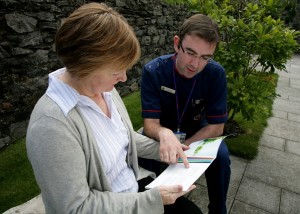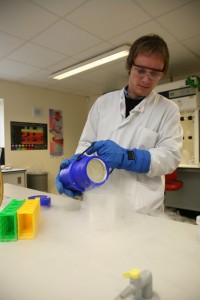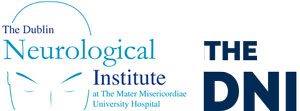This year approximately 44,000 people across Ireland will be diagnosed with a neurological condition, that’s in addition to the 700,000 people already diagnosed. Today with a ratio of just 1 per 140,625 people, Ireland has the lowest number of Consultant Neurologists per head of population in the entire western world.
The Dublin Neurological Institute will go a long way towards improving the care and services available for neurological patients but we need your help to continue funding this essential facility.
While much has been achieved we have much to still do and big plans for the next 5 years. Our aim has always been to provide a centre of excellence where clinical care and research thrive together. The last 5 years have gone a long way to producing this. Going forward we will continue to expand on the specialised clinics and information sessions that we offer. We will continue with our research projects to help find better treatment options and cures to these debilitating conditions. We will also fund more complimentary therapies to increase the holistic services we are offering patients.
We also hope to expand on the information sessions that were started in 2013. Through our information sessions that are held within the Institute the aim is to provide information to attendees on topics such as what the diagnosis means, what help and assistance may be available to them, what are the current treatments available and other topics to help support the very valuable work that carers do day to day.
A Message from Professor Tim Lynch, Clinical Director
The DNI is a registered charity and a Centre of Excellence where we care for patients with neurological disease including, Parkinson’s Disease, Motor Neurone Disease, Multiple Sclerosis, Headache, Epilepsy, Stroke (to name but a few)
Since the DNI opened in 2008 we have developed specialist clinics which continue to expand year on year. In 2014 the number of patients who came through the door of No 57 Eccles St was 3,915. We hope to open two new clinics shortly – A Stroke Prevention Clinic and a new Multiple Sclerosis Clinic which will be run jointly by our non-Consultant Hospital Doctors and our Clinical Nurse Specialists.
Staff members in the DNI are very aware that a neurological illness can affect the lives of more than just the patient. The partners and family members can often feel isolated and helpless. Many experience feelings of anger, sadness, loss and frustration. Through the DNI we organise regular informal meetings for patients and their carers / family members. These information sessions are presented by the multi-disciplinary teams involved in the specialty. Feedback has been excellent and patients and families enjoy the opportunity to meet others who are experiencing similar problems, while having the chance to discuss / and listen to the opinions of experts in an informal setting.
Our research programmes continue to expand and we are hopeful that in time, we will find better treatment options and cures for many debilitating neurological conditions.
To ensure we can maintain the flow of care to the thousands of patients who enter the DNI each year, we need continuous fund raising.
Professor Tim Lynch FRCPI., FRCP (London)
Consultant Neurologist
Where Does Your Donation Go? A Look Into Some of the Work We Do
A Day in the Life of Brian Magennis
A day in the life of Brian Magennis – Clinical Nurse Specialist in Neurology (Parkinson’s Disease & Movement Disorders) at the Dublin Neurological Institute (DNI)

I have worked in the Neurology Department at the Mater Hospital since 2003. There are 5 elements to my role as a Clinical Nurse Specialist (CNS)-a Clinical Focus, Consultation from other Healthcare Professionals, Education& Training, Patient Advocacy and Research & Audit.
The most interesting thing about my job is that every day is different and can be both challenging and very rewarding. To give you an insight into a typical day I will briefly outline an average Monday.
I start at 7 45am, my voicemail usually has a few messages that have been left over the weekend which I check and log. These can be really varied, from patients, families and other healthcare professionals contacting me at the DNI. The phone continues to ring with queries throughout the day from patients looking for help and advice. My patients also have the facility to email me with problems and queries. During this time I also check them and other general correspondence.
Usually around 10am I make my way over to the main hospital from the DNI to review in-patients who are under the care of Professor Lynch within my speciality. If there is a person with Parkinson’s disease or a movement disorder within the hospital they can be referred to me by their medical team through the nurse referral system. I usually get asked to assess patients, review their medications and offer specialist advice.
I then head back to the DNI at 12pm for the Multi Disciplinary Team (MDT) meeting which takes place in the conference room. At this meeting all of the Neurology team get an opportunity to discuss our patients together, their progress, concerns or any other issues.
The Neurology Journal Club follows this MDT meeting over lunch from 1pm to 2pm. This is a learning and education forum where each member of the team take it in turn to present a patient case or a topical issue. Recently, I presented on palliative care issues in Parkinson’s disease.
Around 2pm it’s back to the desk to check voicemails and emails for about half an hour. At 2 30pm the Family and Carer Support Clinic starts. This clinic is a new initiative which I set up mid 2011 for family members and carers of patients who attend the movement disorder services. The aim is to provide education, support and advice, creating a better understanding of the persons needs at home and potentially avoiding a crisis situation which often results in a visit to the Emergency Department.
Once the Clinic is finished I return to my office desk. Throughout the day I get bleeped and contacted with various other issues which I work to have resolved by the time I’m due to finish at 4pm.
Research We Help Fund

Research interests of the Neurology Department include the clinical, radiological and genetic aspects of movement disorders and other neurodegenerative conditions in particular the department is busy assessing families with neurodegenerative disorders including Parkinson’s disease and frontotemporal dementia. The laboratory aspect to this research is to be developed. Research at the DNI has led to the discovery of two new genes involved in Parkinson’s disease and also contributed to the discovery of a gene causing Motor Neuron Disease and Frontotemporal Dementia. We are immensely grateful to all of our patients who have participated in the study to date and to the brave spouses and family members who have also signed up!

